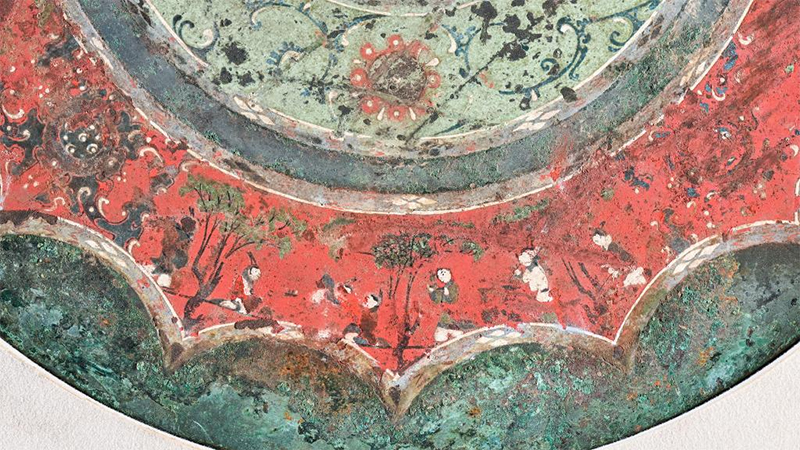US student, teacher express affection for China

LI MIN/CHINA DAILY
While there has been a drop in the number of students from the United States in China, some of those who study in the country say they have a good impression of China and have expressed a desire to further integrate into society.
"Unlike some of the media's depictions that the way things work in China is totally backward, I have experienced a friendly and dynamic country," Philip Freeman said.
The 23-year-old man from Seattle, Washington state, said he came to Beijing in August because as a graduate student pursuing a master's in international relations at the University of International Business and Economics, he thinks it's important to be open-minded about other cultures and experience different societies firsthand.
Freeman said that China offered him a "competitive" scholarship that covers his tuition fees and provides him with a monthly stipend of 3,500 yuan ($478.90).
While most of his relatives tried to persuade him not to come to China out of concern for his safety, he said his sister, who had once traveled to China and supported his decision to study there, told him, "I think you should cherish this opportunity, and you're going to like the country for its strong cultural presence."
In the three months since his arrival, Freeman has been busy with school work but has also enjoyed visiting famous sites in Beijing, including iconic Qianmen Street, and has actively participated in UIBE's baseball club each week. He has also joined the university's Model United Nations club and is looking forward to taking part in other activities.
"I'm only a college student, and I'm pleased to stay here," he said.
Freeman is one of the relatively few US students to come to China since the end of the COVID-19 pandemic, something that US government officials have expressed concern about.
After a recent meeting with Wesleyan University President Michael Roth, who was in Beijing and Shanghai to recruit prospective students and meet alumni members, US Ambassador to China Nicholas Burns wrote on social media on Oct 26: "We discussed the importance of (US) universities, students, scholars returning (to China). There are currently only roughly 350 American students in China, compared to more than 11,500 in 2019."
Like Freeman, other US citizens studying or working in the education sector in China have also developed an affection for the nation.
Chris Oniya, a 36-year-old teacher from Houston, Texas, has spent nearly half his life in China.
As a teenager, he assisted with garment imports coming into his state from Guangzhou, Guangdong province. That work aroused his curiosity about China, and with financial support from his uncle, he decided to come to the country to study international trade at UIBE when he was 19.
As an extrovert who is open to new things, Oniya said he was pleased with the high level of education he received and the friendly nature of his schoolmates. However, he felt isolated from time to time and believed that international students were not cared for as well as Chinese students were.
"The alumni association is supposed to provide services for both Chinese and international students. However, international students are often being neglected in the actual operation, resulting in the school's loss of precious alumni resources and the student's loss of the sense of belonging," he said.
After explaining the problem to UIBE authorities, Oniya received funding and student contact information from the university to set up an international alumni association in 2012, with an aim to hold alumni liaison seminars and forums, provide information about internships and jobs, and promote cooperation between Chinese and international students.
The association quickly gained popularity as Oniya began recruiting students from various nations to establish branches of the alumni association on campus to serve their fellow countrymen.
The first batch of branches was established for Japanese, South Korean, Indonesian, Thai and Vietnamese students in 2012. A branch for US students was established in 2013.
In 2017, Parviz Davlatzoda, Tajikistan's former ambassador to China, was a guest at meeting held by the association's Tajikistan branch. There are currently 27 branches on the UIBE campus covering students from Asia, Africa, Europe and the Americas.
Impressed with his efforts, UIBE exempted Oniya from entrance exams and waived his tuition fees as he pursued his master's and doctorate over the years. He was also offered a job teaching business English at the university after earning his doctorate earlier this year.
Oniya said that the pandemic had a major impact on international students at UIBE, as well as his own studies, which were suspended. Furthermore, the Beijing Center of Chinese Studies, UIBE's program on Sino-US student exchange, was suspended, and the international alumni association hasn't held any online or offline activities for a long time.
"I went back to Houston in 2020 and returned to Beijing in June," Oniya said. "I'm brushing up on my Chinese and trying to resume the activities of the international alumni association."
Photos
Related Stories
- US businesses forge link with China on climate
- China-U.S. cooperation contributes to rapid development of Port of Los Angeles
- To move China-U.S. relations on track of healthy, stable, sustainable development
- Interview: Close cooperation between business communities important impetus for U.S.-China ties
- Summit charts clear course for China-US ties
- Interview: U.S. makes wise choice to collaborate with China, says expert
Copyright © 2023 People's Daily Online. All Rights Reserved.









